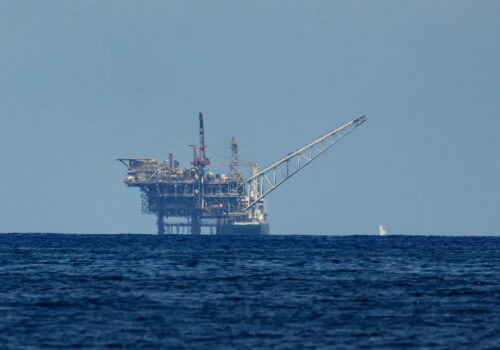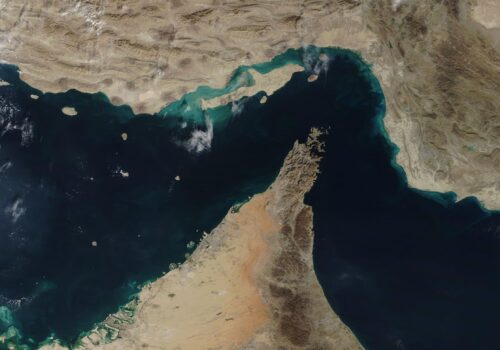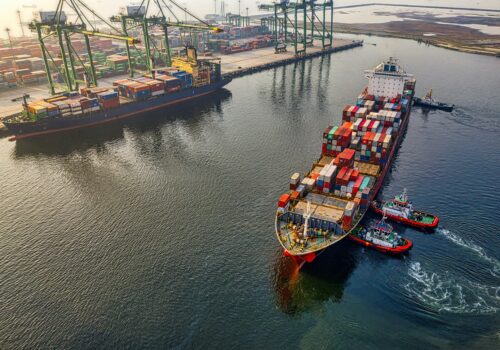Since Iran fired over 180 ballistic missiles at Israel on October 1, speculation about Israel’s response has intensified. According to Israeli officials, the country is planning a “significant retaliation” that could target Iran’s crude oil production and export infrastructure.
Iran is taking this threat seriously. Shortly after the October 1 attack, the National Iranian Tanker Company directed several empty tankers to leave their moorings at Kharg Island, where 90 percent of Iranian oil is loaded for export. These tensions are unsettling the market—the price of Brent crude jumped nearly 4 percent on October 7 in anticipation of Israel’s response.
STAY CONNECTED
Sign up for PowerPlay, the Atlantic Council’s bimonthly newsletter keeping you up to date on all facets of the energy transition.
Although analysts are rivetted by the prospect of an attack on Iran’s oil production and export facilities, the likelihood of this is actually fairly low. Here’s why:
The mission would be complicated and risky
Iran’s oil assets are spread out mostly along its Gulf coastline. Oil fields are concentrated in Iran’s northern region but stretch towards its interior. Multiple pipeline networks connect the various fields to refineries and output terminals. The most significant facilities are the Abadan refinery, located on the coast along the border with Iraq, the Kharg Island terminal in the center of Iran’s Gulf coastline, and the Bandar Abbas refinery and terminal, both located at the Strait of Hormuz. Of these, Kharg Island and the Bandar Abbas terminal are key to disabling Iran’s oil export industry.
The logistics of targeting both of these facilities are challenging given the distance, likely use of Arab airspace, and Iran’s Russian air-defense system, though Israel demonstrated back in April its ability to contend with, and damage it. Kharg Island is also near an Iranian nuclear facility and thus more heavily protected. Although former Israeli officials insist that Israel is capable of such an attack, the risks associated with it probably outweigh the benefits such a strike would achieve at this point. A successful attack on Iran’s oil production and export infrastructure would alienate the United States, imperil relations with the United Arab Emirates and other Arab neighbors and anger China, Iran’s largest customer of crude oil and condensate exports. This damage would be long-lasting and significantly more difficult to repair than the physical damage to Iran’s oil export infrastructure.
But Israel’s bluff offers strategic advantages
Still, there is an advantage to manipulating adversaries (and allies) into believing you will do anything in pursuit of victory. Since Iran’s most recent attack, current and former Israeli officials have spoken openly about attacking Iran’s crude oil industry and probably have seriously considered it. But even if Israel does not undertake this approach—which would dramatically escalate the conflict with Iran—Israel has put itself in an advantageous position. Now, a response targeting Iran’s military sites through military and/or cyber means, will appear restrained compared to Israel’s public messaging.
According to recent reports, the United States just agreed to send Israel the Terminal High Altitude Area Defense (THAAD) missile system, along with the military personnel to operate it. It is likely that the Biden administration agreed to deploy this system to mollify Israel and to deter additional ballistic missile attack from Iran.
The United States successfully employed a similar strategy to extricate itself from the Vietnam War. According to Henry Kissinger, he and President Richard Nixon sought to make North Vietnam and the Soviet Union “think we might be ‘crazy’ and might really go much further.” Through massive bombing campaigns and veiled nuclear threats, they intimidated North Vietnam and succeeded in getting Moscow to pressure Hanoi into the diplomatic concessions needed to bring the conflict to a negotiated conclusion within a relatively brief timeframe.
The real impact on markets
Market watchers should understand that despite the rhetoric, Israel’s next move isn’t likely to disrupt Iranian oil production or exports. However, Israel could deliver a strong-but-not-crippling blow to Iran’s economy by targeting its domestic gasoline industry. Israel was linked to a December 2023 cyberattack that disabled the majority of gasoline stations in Iran, and a similar attack on Iran’s steel industry.
A cyberattack followed by a military strike is a likely Israeli response to the Iranian missile barrage. A potential target could be the Abadan refinery, which produces a quarter of Iran’s gasoline supply. Fighter jets would only have to fly over Jordan and Iraq, and the area is not as heavily defended as Kharg Island. Hitting Abadan wouldn’t roil oil markets because most of its production is consumed domestically, and an outage wouldn’t impact crude exports.
It is clear that Israel wants the United States and Iran to believe it will attack Iran’s oil industry. However, traders, market watchers, and policymakers must understand that this is very unlikely, and that a much more limited attack with minimal global impact is far more likely.
Ellen Wald is a nonresident senior fellow with the Atlantic Council Global Energy Center and the author of the book, “Saudi, Inc.: The Arabian Kingdom’s Pursuit of Profit and Power”.
MEET THE AUTHOR
RELATED CONTENT
OUR WORK

The Global Energy Center develops and promotes pragmatic and nonpartisan policy solutions designed to advance global energy security, enhance economic opportunity, and accelerate pathways to net-zero emissions.
Image: Israeli Soldiers. (Toa Heftiba, Unsplash) https://unsplash.com/photos/group-of-armed-men-with-white-flag-Y1BdWi52y14





